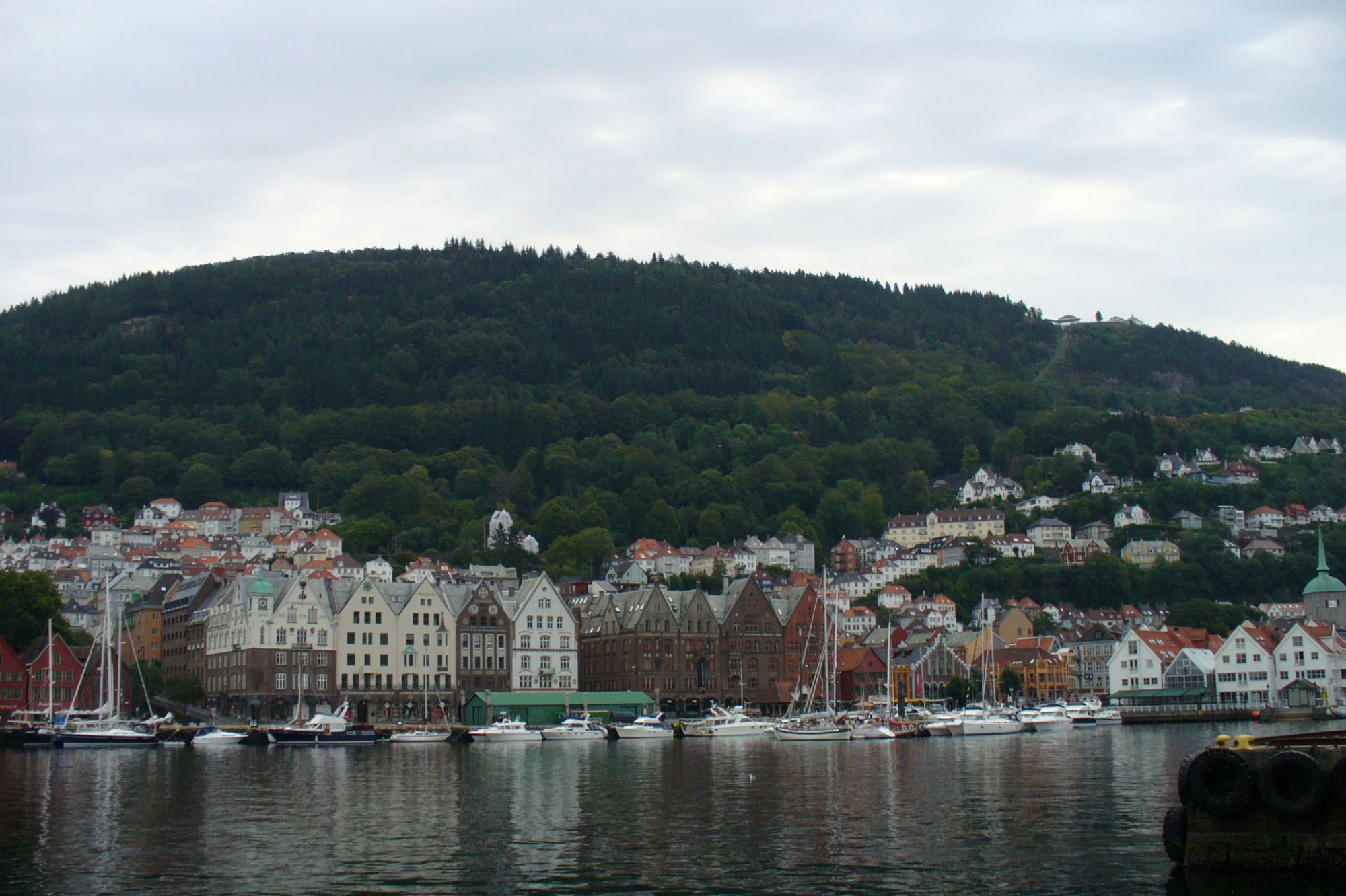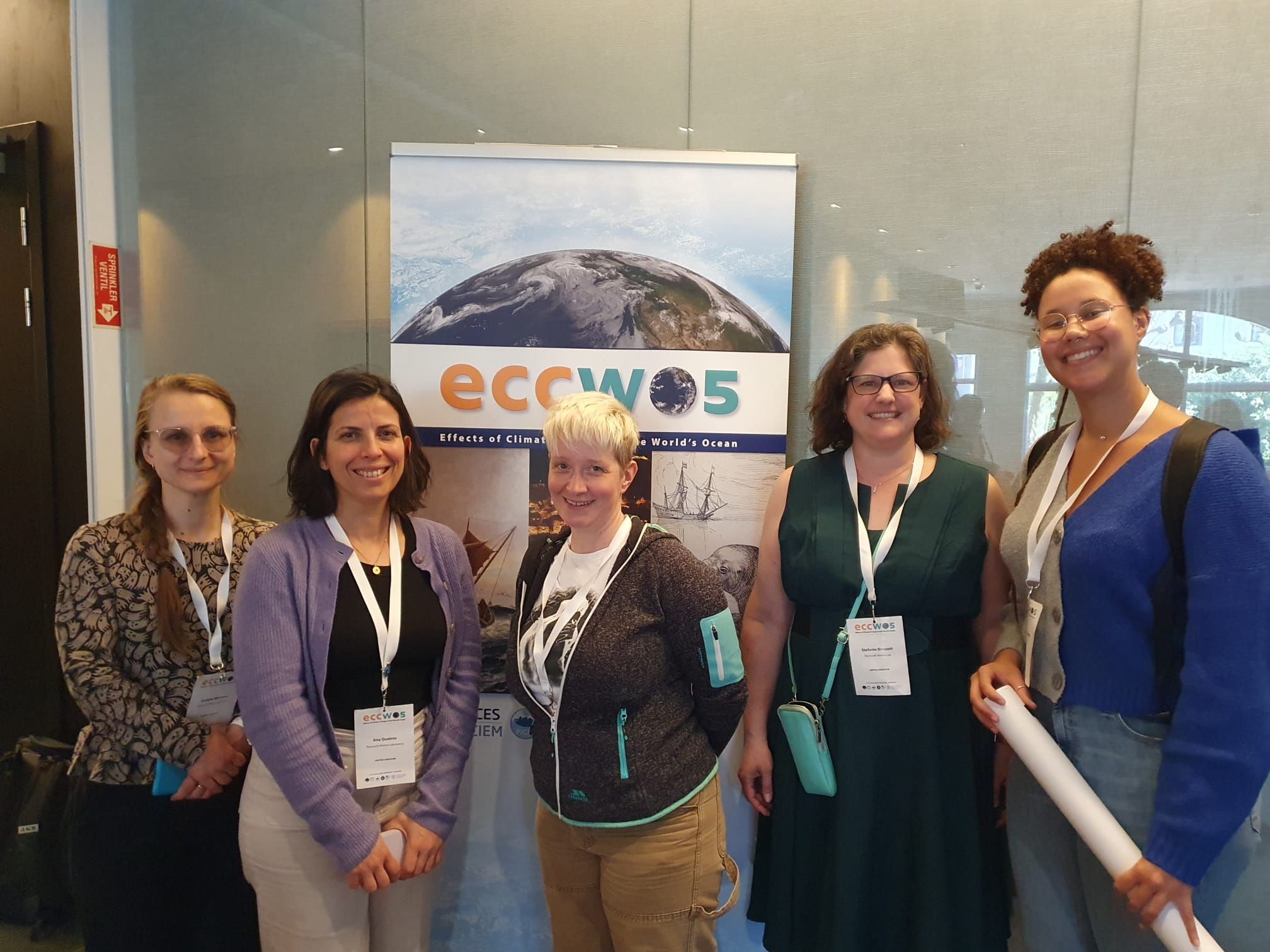Story
PML scientists at major conference: 'Effects of Climate Change on the World's Oceans'
4 May 2023

Four of our scientists represented Plymouth Marine Laboratory at the major conference: 'Effects of Climate Change on the World's Oceans' (ECCWO) in Bergen, Norway. The interdisciplinary team included: Dr Ana Queiros, Dr Océane Marcone, Dr Elizabeth (Liz) Talbot and Dr Stefanie Broszeit, who all delivered talks on a range of issues.
When they got back to the lab, they kindly sat down to tell us all about it... you can hear their different experiences, perspectives and takeaways below.
Spoiler: you will feel a renewed sense of hope after reading!
Meet our ECCWO team

From left to right: Dr Océane Marcone, Dr Ana Queirós, Dr Elizabeth (Liz) Talbot, Dr Stefanie Broszeit, and, maybe a familiar face for some - Daniela Almeida, who was an MSc student with PML.
How would you describe and summarise ECCWOC5 in just a sentence or two?
Ana: Biggest ocean and climate conference in the world. An absolutely fantastic, bright and open community. Great support for ECR (ECOPS as they are called there).
Stefanie: A sobering yet hopeful meeting of marine climate researchers. A space for dialogue among researchers from different disciplines all taking marine climate change.
Liz: A really positive place for engagement with colleagues from many different research fields. Amazing support, encouragement and opportunities for ECOPs (early career ocean professionals).
Océane: A fantastic opportunity to hear about the research around the impact of climate change on the ocean and people, and possible pathways to cope with such changes and increase resilience
What were your key takeaways from the conference?
Ana: The climate change evidence for ocean changes is overwhelming. We are seeing effects across the board, in terms of biodiversity and resource changes. Without adequate management of these changes, the sustainability of our ocean, its wildlife, is under threat, with dire consequences for maritime sector resilience, coastal communities, global health, food security and nutrition.
Stefanie: The take home message was that the change is here - and it is recent - with marine resources moving or being lost over the past 10-20 years, and that this cannot be tackled by single discipline research. Hence the importance of a respectful and open community.
Liz: Climate change is real; the ocean is suffering and emissions need to be reduced now. However, all isn't lost (yet). There is hope among the research community that we can provide solutions for climate change mitigation and adaptation of marine resources and the sectors that depend on them.
Océane: Climate change is already impacting the ocean, and the resources people and coastal communities rely on, and, beyond the need to reduce CO2 emissions, there is also a need to develop management strategies that account for current and future change if we want to be able cope with those changes.
Could you describe the subjects of your individual talks, why you’re passionate about them, and why these issues are important in the context of climate change
Ana: I spoke about the need to deliver climate-resilient spatial management of the ocean, within and outside national jurisdiction. My main point is that we already have very good tools that allow us to anticipate changes in the ocean and how, when and where they affect marine biodiversity, marine ecosystem functioning and maritime sectors reliant on marine species and habitats. With renewed efforts to assess associated social and economic feasibility of climate smart approaches informed by this evidence, and ever closer working collaborations between science, policy, industry and private sector, I am hopeful that we are turning the tide to how to deliver a sustainable ocean under climate change.
Stefanie: One way to bridge different disciplines is to use frameworks that can be used by all researchers, and ecosystem services are a great tool to do that. To assess climate change (and other) impacts on marine environments, biodiversity and coastal communities, it is vital to have good indicators to measure changes on ecosystem services. In recent years I have developed approaches to collect and assess indicators that can provide this information. And the bonus is that they are already being used - so there is no need to invent anything new, and data are already available.
Liz: I talked about the spatial management of fisheries in the Philippines in the face of climate change, and the fact that communities in the tropics with historically low CO2 emissions are bearing the brunt of climate change impacts. Without strong global emissions reductions, many of these fisheries will struggle to be sustainable in the future, with dire consequences for food security and incomes in these areas. Local and regional scale adaptation and mitigation strategies can only do so much in these circumstances.
Océane: My talk focused on the need to include social and economic perspective in management tools (i.e. climate-smart marine spatial plans) if we (scientists) want our findings and outputs to be actually used and implemented in/for the management of the ocean. We need to go a step further and try to bridge that gap between science and policy-making. It is not enough to deliver really nice and relevant scientific output, we need to make sure they are relevant for the interested parties and decision-makers and it call for interdisciplinary research.
Are there any other special thoughts or moments, or anything else you might like to add?
Ana: Please join the conference. An excellent, open and global community spearheaded by the good people of ICES, PICES, IOC and FAO. I learned so much!
Stefanie: I really enjoyed this conference, I felt at home with the people and researchers who are doing science to an impressively high standard. I highly recommend this conference to anyone who needs to learn more about climate change and those who like to share their science.
Liz: I can't recommend this conference highly enough - especially for ECRs. The community are open, engaging, collaborative and really want to hear about your science!
Océane: There were so many interesting talks and sessions. Everyone was really nice and open-minded. The conference was so well organised, with nice social events too. The plenary talks were so interesting as well. It was amazing to hear about Christina Hicks work. outside of my field of research, both Randi Ingvaldsen’s talk (“Atlantification and borealization in the Barents Sea and adjacent Arctic Ocean”) and Renato Salvatteci (“Measuring and predicting responses of marine social-ecological systems to climate extremes”) managed to make their research very accessible and fascinating.
Find out more about the 'Effects of Climate Change on the World's Oceans' Symposium here >>